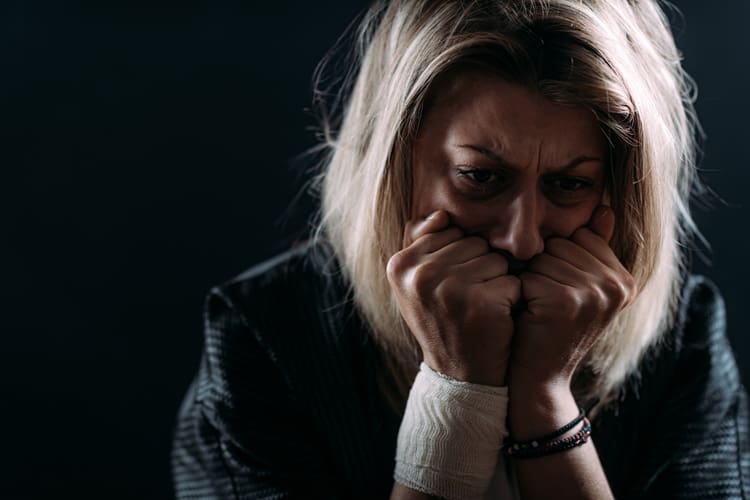Post-traumatic stress disorder (PTSD) affects people emotionally and mentally. It causes them to have nightmares and experience unwanted memories. They deal with severe anxiety and have difficulty functioning in their daily life. Many people struggling with post-traumatic stress disorder try to get relief from symptoms by using alcohol or drugs.
What Is Post-Traumatic Stress Disorder or PTSD?
Post-traumatic stress disorder results when an individual experiences or witnesses a terrifying event. Symptoms of PTSD may include vivid flashbacks, causing the individual to feel like the trauma is happening again; nightmares; uncontrollable. intrusive images or thoughts of the event; and severe anxiety. The person often feels intense distress at symbolic or real reminders of the trauma and experiences physical sensations including pain, nausea, sweating, or trembling.
Although some people who have experienced traumatic events can adjust and cope over a short time, many cannot. If the symptoms last for a month or longer and affect the person’s ability to function on a day-to-day basis, they likely have PTSD. In some cases, the symptoms of post-traumatic stress disorder may not appear for years after the individual experienced the traumatic event.
What Are the Causes of Post-Traumatic Stress Disorder?
After experiencing or witnessing a traumatic event, a person may feel out of control or powerless, leading to the development of PTSD. War or combat exposure is most popularly linked to PTSD, but childhood or domestic abuse, physical or sexual assault, rape, serious accidents, torture, or natural disasters can also lead to PTSD.
In short, PTSD can be caused by any experience that the person feels as traumatic, including being threatened with a weapon, having difficult experiences at childbirth, losing a loved one, or being admitted to intensive care.
Post-Traumatic Stress Disorder & Addiction
People suffering from post-traumatic stress disorder often abuse alcohol or drugs as a way of self-medicating. In the United States, six to eight percent of adults have post-traumatic stress disorder. Of those individuals, 46% have a substance use disorder. People suffering from post-traumatic stress disorder are 14 times more likely to become addicted to drugs or alcohol compared to those who do not suffer from PTSD.
Three Ways PTSD & Addiction Are Related
- People become addicted to drugs and/or alcohol in the process of self-medicating their PTSD symptoms. Substances can temporarily numb the emotional and mental pain of PTSD.
- When a person uses drugs or alcohol, they increase their risk of experiencing traumatic events. If they do have a traumatic experience, it could result in the development of post-traumatic stress disorder.
- Certain people may be genetically vulnerable to developing post-traumatic stress disorder and a substance use disorder.
PTSD & Addiction: Co-Occurring Disorders
When a person has two different disorders together, it is called a dual diagnosis or co-occurring disorder. The combination of post-traumatic stress disorder and a substance use disorder is common. When a person suffers from this dual diagnosis, they have a higher risk of experiencing negative consequences resulting from their illnesses, such as depression, anxiety, irritability, and aggression. They often have problems in their relationships and the workplace.
Additional negative consequences of these co-occurring disorders can include:
- Legal, medical, or financial problems
- Self-destructive or risky behavior, such as driving recklessly or engaging in unprotected sex
- Confusion, hallucinations, and delusions
- Paranoia
- Inpatient psychiatric hospitalization
- Suicide attempts
Individuals who have both a substance use disorder and post-traumatic stress disorder generally experience more issues than people who have just one of the two disorders. For example, a person with co-occurring disorder tends to have more chronic physical and mental health problems, an increased rate of suicide attempts, and a higher probability of being at risk for violence. They also have more financial and legal problems, less improvement during treatment, and poorer treatment outcomes.
Do You Need Help?
Addiction is a chronic brain disease that can affect anyone. If you or a loved one struggles with a drug or alcohol addiction in conjunction with PTSD or another mental health disorder, you are not alone. Help is available. At Anabranch Recovery Center located in Terre Haute, Indiana, skilled professionals will help you regain your sobriety. Now is the time to take the first step on your path to recovery.
About the Author: 
Terry Hurley is a retired educational professional and freelance writer with more than fifty years of experience. A former reading specialist and learning center director, Terry loved her years working with children in the educational field. She has written extensively for print and online publications specializing in education and health issues. For the last six years, her writing focus has been on addiction and mental health issues.





